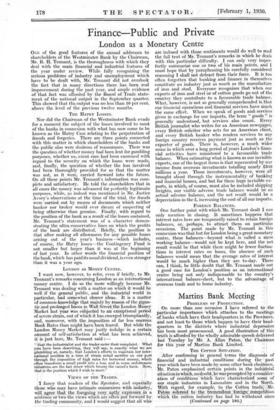THE HATRY LOSSES.
Nor did the Chairman of the Westminster Bank evade for a moment the subject of the losses involved to most of the banks in- connexion with what has now come to be known as the Hatry Case relating to the perpetration of frauds and forgeries. There are three points connected with this matter in which shareholders of the banks and the public also were desirous of reassurance. There was the question of whether money had been lent for gambling purposes, whether sth-icient care had been exercised with regard to the security on which the loans were made, and, finally, the question of whether the loss involved had been thoroughly provided for so that the matter was not, as it were, carried forward into the future. On all these points Mr. Tennant's information was com- plete and satisfactory. He told the shareholders that in all cases the money was advanced for perfectly legitimate purposes, while, as indeed was mentioned in Mr. Justice Avory's observations at the time of the trial, the frauds were carried out by means of documents which neither banker nor broker would ever dream of suspecting of being otherwise than genuine. Finally, with regard to the position of the bank as a result of the losses sustained, Mr. Tennant's statement was of a character demon- strating the ultra-conservative lines on which the profits of the bank are distributed. Briefly, the position is that after making all allowances for any possible losses arising out of the year's business—which includes, of course, the Hatry losses—the Contingency Fund is not smaller but larger than it was at the beginning of last year. In other words the financial position of the bank, which has paid its usual dividend, is even stronger than it was a year ago.






































 Previous page
Previous page